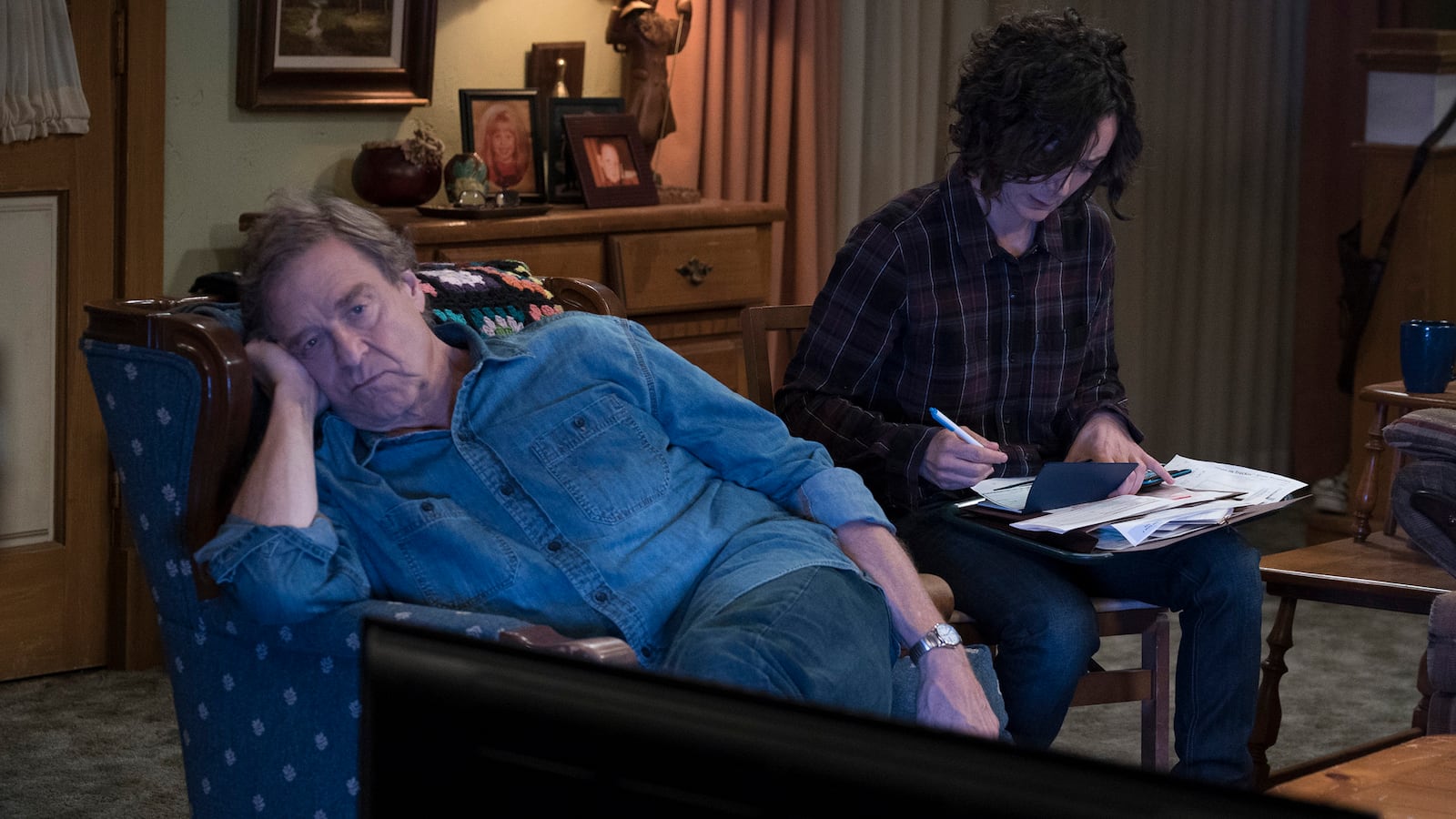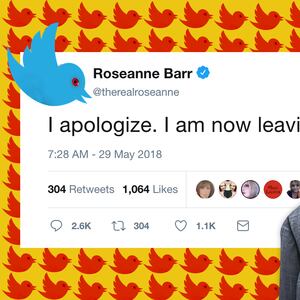There are casserole dishes, so many of them, scattered all through the Conner family kitchen. They are hoarding them, the best dishes from every family in Langford, and wondering aloud to themselves: Why do people always send over casseroles when someone dies?
Yep. Ding-dong, good riddance, good grief, what have you. Roseanne is dead.
It’s revealed within seconds of the new Roseanne spinoff, The Conners that Roseanne Conner, the character played by Roseanne Barr off and on for 30 years, has passed away. The series premiered Tuesday night with skeptical eyes trained on that specific question: How it was going to write Barr’s character off. Now we have the answer. She overdoses on opioids, succumbing to an addiction that was first introduced in last year’s blockbuster Roseanne revival.
That volatile revival—ratings bonanza, cultural lightning rod—finally imploded over the summer, detonated by Barr herself. When the actress tweeted racist comments about Valerie Jarrett, ABC swiftly canceled the revival just as production was beginning on season two, leaving the show’s cast and crew suddenly without jobs.
Still very much in the business of working with co-stars John Goodman, Sara Gilbert, and Laurie Metcalf—and in the business of keeping a hold on that viewership—ABC scrambled to put together a spinoff without Barr’s involvement. She agreed to forfeit her intellectual property rights, so as to not profit off The Conners in any way.
Right off the bat, you’ll notice an earnestness in The Conners (this is death we’re talking about) and maybe miss the bit of caustic bite that Barr brought to Roseanne. But aside from that palpable sweetness, something especially evidenced in next week’s episode, The Conners essentially shares the same identity as Roseanne. Just, you know, without Roseanne.
Still, it takes about seven minutes or so for the show to finally feel that way.
The opening moments make for a tense viewing experience, the audience confronted at once with Roseanne’s death and how the family is handling it. At first, they are under the impression that Roseanne died of a heart attack. But then Becky (Lecy Goranson) finds a bottle of pills while cleaning out her mother’s closet. Everyone is upset, because Roseanne was supposed to have kicked her addiction. Dan (John Goodman) takes the bottle. “Damn,” Becky says. “That was the one thing from mom’s closet I actually wanted.”
Guffaws abound. Permission to laugh.
The fact that Roseanne overdosed is made clear minutes later when the family receives a phone call informing them that the original autopsy report is incorrect. It wasn’t a heart attack, but opioids that killed her.
For everything we admired and enjoyed about The Conners premiere and one other episode we watched, this is what we found exceptionally problematic, vaguely mean-spirited, and upsetting.
The first thing to get past is the death itself. We knew the death was coming, which is why we’ve been free flowing with the spoilers. Both John Goodman and Roseanne Barr have already revealed in interviews that an overdose would be the character’s demise.
But there’s a tonal dissonance between the public opinion that led to that creative decision, and how we’re meant to feel about it while watching Tuesday night’s episode.
Because of the overwhelming cultural anger and outright hatred directed toward Roseanne Barr because of her racist, incendiary views and spreading of harmful political conspiracy theories, there’s almost a note of appeasement in killing off her TV alter ego. The idea is that, for some, it’s fictional justice for the actress’s real-world sins. No matter what the show’s creative team might say about the intent behind killing the character off, the ugliness of the discourse surrounding Roseanne—the reason for The Conners’ very existence—colors the premiere.
All of that is at odds with how The Conners asks us to feel, not about the loss of Roseanne Barr, but the loss of Roseanne Conner—a separation of art and artist that became increasingly difficult during last year’s revival.
Her family is mourning, and we are supposed to as well. My goodness, these scenes are well-acted. Metcalf delivers an Emmy-worthy monologue while spiraling about what place she has, not only in the family, but in the world without her sister. Goodman nails towering scenes grappling with anger over the revelation that his wife was hiding her ultimately lethal pill addiction. And Gilbert and Goranson as Darlene and Becky take the baton from Roseanne and Jackie, poignantly portraying the emotional, bickering sibling dynamic.
But it feels odd, even difficult, to grieve the loss of this character—even if the performers are portraying their characters’ grief as authentically as they are.
The episode is stripped of the MAGA politics that brought last year’s revival so much attention. Yet the circumstances of an opioid addiction and overdose are inherently political. Used here as the impetus for the death of a character played by Roseanne Barr, it’s well-intended, but messy.
Roseanne, in all iterations, was celebrated for setting its comedy against a backdrop of real-world, highly politicized issues, particularly those facing blue-collar, middle Americans and typically ignored by mainstream pop culture. Introducing the opioid crisis as a major storyline falls arguably in line with that, even if, as we saw last season, it overly simplified a complex issue and didn’t entirely get it right. But to then use that as the cause of Roseanne’s death borders on tone deaf.
Maybe it’s intended to be profound. But there are those who would refute that. The argument is that, given Barr’s behavior, her character’s overdose could read as some sort of deserved punishment for a bad tweet, which diminishes the reality of addiction faced by many Americans. When the character we’re meant to feel compassion for is played by someone viewed as a villain, death-by-addiction carries a tone of “she had it coming.”
The episode attempts to undercut that with a handful of powerful scenes, specifically a stand-off between Goodman’s Dan and guest star Mary Steenburgen, whose character’s name is on the prescription bottle Becky finds. He brands her an accomplice to addiction and murder for helping Roseanne secretly procure pills. She explains that the entire community helps those who can’t afford or attain the pills themselves because of the health care system and the economy. More, the family finds that Roseanne has been hiding pills from many different sources.
As television, it’s incredibly moving. As cultural commentary, it’s flawed.
We are harping a lot here on how The Conners handles Roseanne’s death because it is, in essence, the reason for the show’s existence, but also because we were forbidden from talking about it in our original review of the series. You can read that here, and it’s mostly positive, reflecting the appealing sweetness of the show and how its comedy comes roaring back when it focuses on matters unrelated to Roseanne’s death. But that doesn’t absolve the series of a certain ugliness with how that death is portrayed.
The other lingering, non-death related question is one that has flummoxed me: Is there really another story to tell here? There are such high dramatic stakes to explore in how a family unit moves forward following a major loss. That’s true in life, and it’s true in The Conners.
This is a family that we have spent 30 years getting to know. How could we not be intrigued by the ways in which they grieve and attempt to move on after the death of their matriarch? That story, we think, is definitely worth telling. It’s the fact, as with every single thing there is to do with this show, that it’s Roseanne Barr, her behavior, and the attitude towards her that casts a shadow on that story that continues to complicate things.
Could this story be told as compellingly without these characters, who we know so well, and these performers, who are so gifted? Maybe. Maybe not. But The Conners is what we have.
It’s not perfect. But it’s good.







